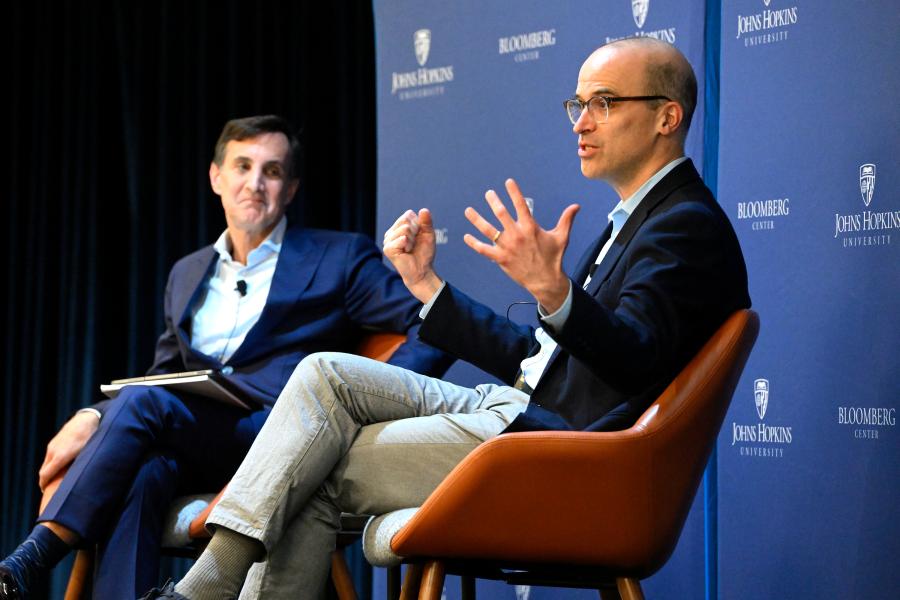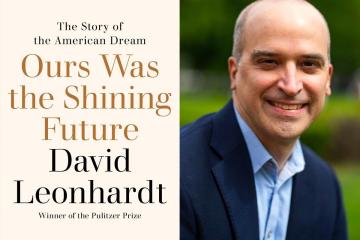- Name
- Johns Hopkins Media Relations
- jhunews@jhu.edu
- Office phone
- 443-997-9009
Pulitzer Prize-winning New York Times journalist and author David Leonhardt spoke about the importance of equitable higher education that provides opportunities for Americans during a conversation with Johns Hopkins University President Ron Daniels at the Hopkins Bloomberg Center in Washington, D.C., on Wednesday afternoon.
The discussion—the inaugural event in the university's new Authors & Insights series—was centered around Leonhardt's new book, Ours Was the Shining Future: The Story of the American Dream, which examines capitalism's varying effects on upward mobility in America. He found an ideal conversation partner in Daniels, whose 2021 book, What Universities Owe Democracy, explores the role universities play in fostering economic mobility.
At the beginning of their talk, Leonhardt identified three major indicators of an economic decline in the U.S.:
- Shifts in economic mobility—92% of kids born in 1940 grew up to earn more money than their parents, he said, but that number has fallen to 50% today
- Americans' overwhelmingly negative view of the economy, an outlook that has persisted for 20 years
- Declines in life expectancy
Individuals who are not feeling the effects of these trends overwhelmingly hold college degrees, which seems to be an important dividing line for Leonhardt in terms of which Americans have the best opportunities to prosper.
"Over 60% of Americans don't have a four-year college degree, and many of the [economic] divides we're talking about are between people with a degree and people without," Leonhardt said. "The deeply alarming life statistics I mentioned before are overwhelmingly driven by stagnation and life expectancy for people who do not have a four-year college degree."
The discussion then explored how well-intentioned policy on trade, transportation, and immigration have left out communities of working class people, whom Leonhardt defines as people without college degrees. Ultimately, Leonhardt expressed hope for an America where every person has the opportunity to receive a higher education, but opting not to attend college wouldn't preclude someone from achieving financial security.
"There's all kinds of evidence that there really is a causal benefit of going to college and finishing it. It's not just what you're learning in the classroom; you're learning to navigate society. You succeed, and it gives you confidence that you can navigate other things," he said. "I don't think everyone should go to college, but we need to develop good jobs that provide good living for people who don't want to go to a four-year college."
The Authors & Insights series aims to bring notable writers, speakers, and thinkers from around the world together in conversation with Johns Hopkins experts. The next event, schedule for Feb. 28, will feature Eliot A. Cohen, a SAIS professor and former State Department official, and Elisabeth Long, dean of Johns Hopkins Sheridan Libraries, Archives, and Museums, discussing Cohen's new book, The Hollow Crown: Shakespeare on How Leaders Rise, Rule, and Fall.
Posted in Happenings
Tagged president ron daniels, sociology, economics, democracy, hopkins bloomberg center









